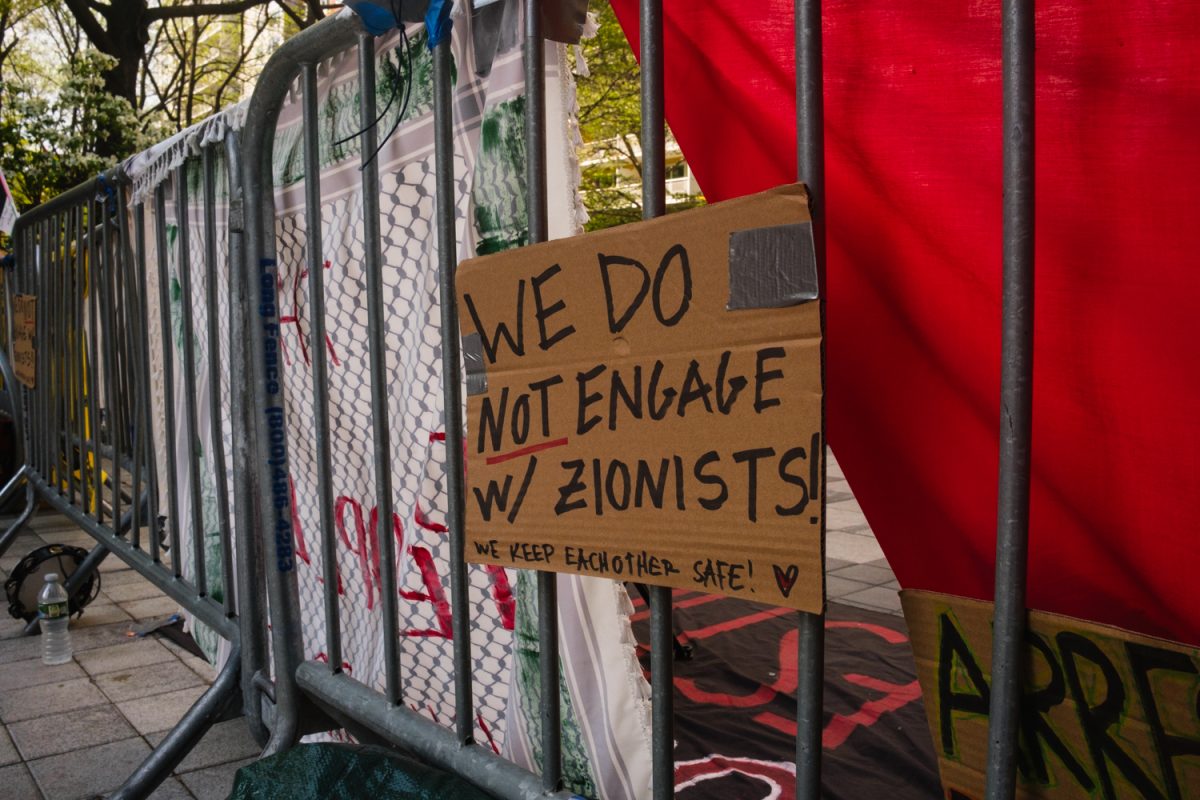On Aug. 22, NYU emailed its student body, asking them to observe changes to its student conduct guidelines, specifically its Non-Discrimination and Anti-Harassment policy. Thinly cloaked behind notions of community safety and inclusivity, these revisions deem speech against Zionism as a potential violation of civil rights law under Title VI of the Civil Rights Act of 1964. However, by conflating Zionism with Jewish identity, NYU has manipulated these definable terms to weaponize Title VI as a means to suppress the political speech of pro-Palestinian protesters and justify their aggressive tactics in dealing with dissent.
NYU’s Non-Discrimination and Anti-Harassment policy is intended to protect students from discrimination and harassment based on various identities, including religion, race, nationality and ethnicity — all categories that Zionism does not fall under.
Zionism is a definable political ideology that people adopt or reject regardless of faith, not a religious or ethnic identity. It is a political and nationalist movement that began in the late 19th century and aimed to establish a Jewish homeland in Palestine. Zionism today consists of views that support the existence of Israel as a Jewish ethno-state. More extreme positions often advocate for the maximizing of Israeli territory at the expense of Palestinian rights.
Antisemitism, on the other hand, is prejudice or discrimination toward Jewish people, which has been the cause of centuries of persecution and violence toward Jewish communities. Opposing Zionism, therefore, does not equate to a hatred of Judaism. It is a stance against a specific political ideology that has, in many cases, resulted in the brutalization and displacement of Palestinians. Critics of Zionism include people from various backgrounds, including members of the Jewish community, who oppose what they see as a nationalist theocracy that prioritizes one group over others.
The university’s updated code of conduct dangerously implies that by engaging in speech against Zionists on campus, you are trying to find a workaround way to be antisemitic. The updated guidelines refer to the term Zionist as a “code word” to mean Jewish. This framing implies that any criticism of Zionism is inherently an attack on Jewish identity, which is simply not the case. Zionism, as a political ideology, is subject to the same scrutiny and criticism as any other nationalist movement. To intentionally conflate criticism of Zionism with hate toward Jewish people is an intellectually dishonest move. It is a disservice to legitimate political discourse and introduces noise into real protections against religious intolerance.
As political affiliations do not fall under the categories of race, ethnicity, color or nationality, one is not shielded from criticism of their political beliefs under Title VI. This has already been determined in Siyu Yang v. Ardizzone, a case tried in a federal district court where the decision dismissed the Title VI claim where the plaintiffs claimed to have been harassed based on their “beliefs about race and their preferred presidential candidate,” stating that “[b]eing treated differently as a result of one’s political beliefs is not the equivalent of discrimination that arises from an individual’s particular race, as is required to establish a violation of Title VI.”
This revision to the Non-Discrimination and Anti-Harassment policy is embedded within a larger paragraph that also cites indisputable examples of antisemitism, such as Holocaust denial or the misuse of Holocaust imagery. This is a purposeful tactic that is meant to blur the lines between Zionism and antisemitism by interweaving them in a way that makes it more challenging to critique the paragraph as a whole without seeming to undermine the legitimate examples of antisemitism included.
It is also notable that NYU has chosen to explicitly address Zionism in its student conduct code when no other political ideology, religious, ethnic or racial group is singled out in this manner. The code states that the examples they showcased are “examples of conduct that are particularly relevant to the issues of the day.” However, for this to be an accurate assertion, the code would also cite the uptick in Islamophobia and anti-Palestinian rhetoric students have faced, or the recent trend last spring of women getting punched around NYU’s Washington Square campus. This selective focus reveals a broader agenda to silence those who challenge Israeli state violence.
In an Aug. 25 statement, NYU’s Faculty & Staff for Justice in Palestine noted that “the new guidance implies that any nationalist political ideology (Hindu nationalism, Christian nationalism, etc.) that is integrated into some members of that group’s understanding of their own racial or ethnic identity should be entitled to civil rights protections. This is a disturbing development that will legitimize far-right and ethnonationalist ideologies under the guise of protecting students from racial discrimination.” The faculty statement goes on to note that “equating criticism of Israel or Zionism with antisemitism has been roundly critiqued by scholars of antisemitism, by Israeli human rights groups, and by our own group.”
NYU is doubling down on the same message to students who stand in solidarity with Palestine for the past year: Your voices are not welcome here. A slight adjustment of wording in policy can have significant implications on the treatment and protection of student protesters in the upcoming 2024-25 academic year. Given the backlash NYU has received from the mainstream media and parents about student suspensions and arrests, it’s unsurprising that they now opt for quieter, more inconspicuous measures to restrict free speech. The email sent out did not outline the specific revisions made, and only when clicking on the link to the new code of conduct and scrolling far down can one discover these concerning alterations. If universities begin to redefine political opposition as discrimination, where does that leave those who strive to challenge how things stand? Either silenced or pushed to the margins.
WSN’s Opinion section strives to publish ideas worth discussing. The views presented in the Opinion section are solely the views of the writer.
Contact Mehr Kotval at [email protected].






















































































































































